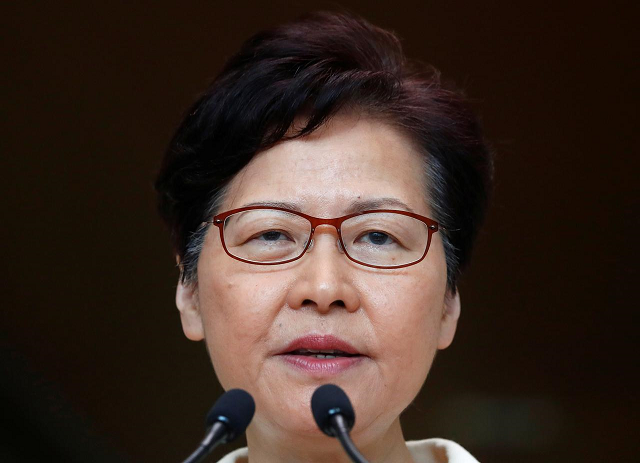Hong Kong leader says escalation of violence will not solve social issues
After three months of unrest, Lam last week withdrew a controversial extradition bill that had triggered the protests

PHOTO: REUTERS
Lam was speaking after another weekend of sometimes violent clashes in the former British colony, with police firing tear gas to disperse protesters in cat-and-mouse skirmishes, at times smashing windows and starting street fires.
“It’s extremely inappropriate for foreign parliaments to interfere in HKSAR internal affairs in any way, and (we) will not allow (the United States) to become a stakeholder in HKSAR matters,” Lam said, referring to Hong Kong’s status as a special administrative region of China.
During a rally at the US consulate on Sunday, thousands of demonstrators had called for help in bringing democracy to Hong Kong.
The protesters wanted the US Congress to pass legislation that would require Washington to make an annual assessment of whether Hong Kong is sufficiently autonomous from mainland China to retain special US trade and economic benefits.
Hong Kong's grandpa protesters speak softly but carry a stick
Chinese officials have accused foreign forces of trying to hurt Beijing by creating chaos in Hong Kong and warned other nations against interfering in what they called an internal affair.
On Monday, former US Defense Secretary Jim Mattis said the anti-government protests were “not an internal” Chinese matter and the United States should offer at least moral support to the demonstrators.
After three months of unrest, Lam last week withdrew a controversial extradition bill that had triggered the protests, but the gesture failed to appease many demonstrators, who are using the popularity of the movement to revive old grievances.
Hong Kong protesters aim to 'stress test' airport
Anger over the now-shelved extradition bill has triggered public opposition to Beijing that had dwindled after 2014, when authorities faced down a pro-democracy movement that occupied streets for 79 days in the central business district.
“Escalation and continuation of violence cannot solve the issues faced by our society now,” Lam told a news conference on Tuesday. “It will only deepen the conflict, contradiction, splits, and even hatred in society.”
Many initially peaceful protests in the past three months have degenerated into encounters between baton-wielding riot police and activists, leading to scores of injuries and about 1,300 arrests.
The protests, beamed live to the world since June, have prompted some of the city’s powerful tycoons to appeal for calm.
In his first speech mentioning the unrest, billionaire Li Ka-Shing urged political leaders to offer young people an olive branch, calling them “masters of our future”, according to an online video of remarks to a small crowd during a monastery visit on Sunday.
Hong Kong returned to China in 1997 under a “one country, two systems” formula that guarantees freedoms not enjoyed on the mainland. Many Hong Kong residents fear Beijing is eroding that autonomy. China denies the accusation of meddling in the city.
Lam said her administration’s actions, including the bill’s formal withdrawal, were “not directly to stop these protests and violence.”
She added, “It is really to express my sincerity to start a dialogue with the people.”



















COMMENTS
Comments are moderated and generally will be posted if they are on-topic and not abusive.
For more information, please see our Comments FAQ